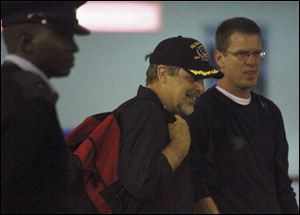
Rescued U.S. captain heads home from Kenya
4/17/2009
Captain of MV Maersk Alabama, Richard Phillips, center, walks with Security Personnel at Moi International airport Mombasa, Kenya on Friday.
MOMBASA, Kenya The U.S. sea captain rescued by Navy snipers left Kenya on an executive jet before dawn Friday on a long-awaited journey home to America.
The departure of 53-year-old Capt. Richard Phillips ends one chapter in the piracy saga plaguing one of the world s busiest sea routes, but attacks are rising even as authorities struggle to find ways to stop them.
Late Thursday, the United States pressed Somalia to root out the pirates menacing the seas off the Horn of Africa, and its prime minister said he could go after them if other nations give him the resources he needs.
That could open the way for more missions to hunt down the pirates inside the lawless country actions that have been authorized by the United Nations but rarely carried out. But Prime Minister Omar Abdirashid Ali Sharmarke has little power inside his own country his government barely has control of a few square miles (kilometers) in the capital, Mogadishu, and only then because the area is patrolled by African peacekeepers.
Sharmarke told The Associated Press his piracy-fighting plan will be ready next week in time for an international conference on Somalia in Brussels.
Phillips did not talk to journalists as he entered the terminal building at the international airport in Mombasa with his head bowed. Wearing dark blue overalls and a baseball cap, the bearded American skipper quickly boarded a waiting plane, a light blue executive jet with the name of his company s shipping line, Maersk. It took off minutes later.
Phillips had been held by pirates for five days on a drifting lifeboat in the Indian Ocean until he was freed Sunday by Navy SEAL sharpshooters who killed his three captors with three shots taken from the a warship during a nighttime assault.
The ordeal highlighted the dangers of operating merchant ships in the Horn of Africa, one of the busiest and most precarious sea lanes in the world.
Phillips, of Underhill, Vermont, gave himself up as a hostage to ensure the safety of the 19-member crew of the U.S.-flagged Maersk Alabama, which was carrying food aid for hungry Africans including Somalis when it was attacked April 8.
The ship s crew flew home from Kenya Wednesday and were safely reunited with their families.
Also Thursday, Abduhl Wal-i-Musi, one of the four Somali pirates who captured Phillips and the only Somali survivor of the attack that freed him, will be brought to New York to face trial, a U.S. official said on condition of anonymity.
In Paris, the French Defense Ministry said 11 pirates its forces seized in a raid Wednesday hundreds of kilometers (miles) off the Kenyan coast will be turned over to Kenyan authorities. The pirates will be brought to the Kenyan port of Mombasa on Monday on the French frigate Nivose, the ministry said.
Mwangi Thuita, Kenya s permanent Foreign Ministry secretary, confirmed Paris had contacted Nairobi about handing over the pirates for trial, but said only that we are considering it.
In March, the European Union and Kenya agreed to allow the East African nation to prosecute suspected pirates captured by European forces on the high seas. The United States and Britain have signed a similar agreement with Kenya, which borders Somalia, allowing suspected pirates to be handed over and tried in Kenyan courts.
French authorities had said the pirates were planning an attack on the Liberian cargo ship, Safmarine Asia.
In Kenya s capital, Nairobi, Sharmarke and the president of the semiautonomous Puntland region met with U.S. diplomats including the Kenya ambassador.
We want to press them to take action against these pirates who are operating from their territory, said State Department spokesman Robert Wood. He said the United States was willing to help but has not decided how best to do so.
U.S. Secretary of State Hillary Rodham Clinton announced a new U.S. initiative Wednesday to battle piracy and said she has formed a diplomatic team to press Somali leaders to take action against pirates operating from bases within their territories.
Sharmarke said his government is willing to share information that could boost the new U.S. initiative to freeze pirates assets and pursue the money trail of their multimillion-dollar ransoms.
We have information on who is behind this, who is involved, Sharmarke said. There is a lot of money flowing in. ... We are following very closely how money is distributed here.
Behind the pirates are some powerful businessmen and a few high-ranking politicians, according to one captured bandit people whom Sharmarke said his government has identified.
He said his government is drafting a plan to fight the pirates by building up its military forces and establishing intelligence-gathering posts along its coast. Sharmarke said the amount of money the pirates have gotten in the last eight months is quite enormous.
With this capital, they are able to get much more sophisticated weaponry and technology. So it is very sad that we have to still deal with this arms embargo to equip our own forces, he said.
A U.N. arms embargo against Somalia has been in place since civil war broke out there in 1991, but the country is bristling with illegal weapons.
Wood said U.S. officials would take up the proposal as soon as possible with a 24-nation group that works on Somali piracy.
Donor nations are reluctant to fund a Somalia s weak government, which offers little accountability and has a ragtag, trigger-happy army of 3,500.
Associated Press writers Michelle Faul, Katharine Houreld, Malkhadir M. Muhumed and Todd Pitman in Nairobi, Jennifer Barchfield and Angela Charlton in Paris and Matthew Lee in Washington contributed to this report.
/AP-CS-04-17-09 0545EDT